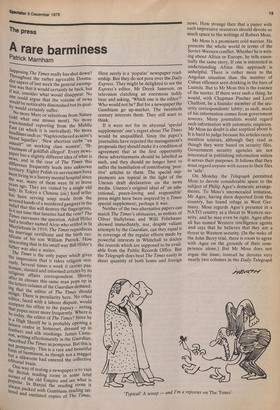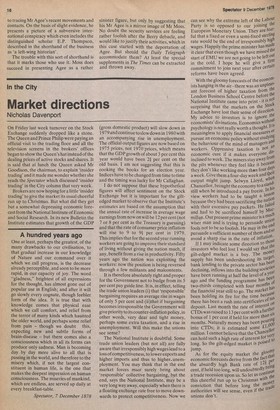A rare barminess
Patrick Marnham SuPPosing The Times really has shut down? Throughout the rather agreeable Dooms day capers of last week the general assump tion was that it would certainly be back, but if not, consider what would disappear. No one could argue that the volume of news would be noticeably diminished but its quality would certainly suffer. No more Marc or selections from Nature (odd what one misses most). No more even-handed reporting from the Middle East (at which it is unrivalled). No more headlines such as: 'Naples relieved as saint's blood liquefies', 'New abortion curbs "an assault" on working class women', treatment of goldfish alleged'. Every newspaper has a slightly different idea of what is news, and in the case of The Times this difference frequently leads into unknown territory. Eighty Polish ex-servicemen have been living in a Surrey mental hospital since the war, many of them were fit to leave Years ago. They are visited by a single old lady, In Tokyo a Chinese (sic) food seller has been serving soup made from the Severed hands of a murdered gangster in the belief that this will destroy the fingerprints. Is it not time that lunatics had the vote? The Times canvasses the question. Adolf Hitler had a brother named Alois who settled in St Marylebone in 1910. The Times reproduces his marriage certificate and the birth certificate of his son William Patrick. How interesting that in his small way Bill Hitler's father was also a waiter. The Times is the only paper which gives the impression that it takes religion seriuusIY. Several times a week it carries passionate, slanted and informed articles by its religious affairs correspondent. Shortly after its closure this same man pops UP in the letters column of the Guardian demanding that the editor of The Times should resign. There is peculiarity here. No other editor, faced with a labour dispute, would that his office to the papacy – noting nat popes occur more frequently. Where is he today, the editor of The Times? Since he IS a High Sheriff he is probably opening a leisure centre in Somerset, dressed up in feathers and silk stockings. James Camer,on, writing affectionately in the Guardian, nescribed The Times as pompous_ But this is not Pomposity. This is a rare and beautiful form of barminess, as though not a maggot out a editorial brain. silkworm had entered the collective +, One way of testing a newspaper is to visit we British reading room in some fetid corner of the old Empire and see what is Po. Pular, In Banjul the reading room is _always packed with Gambians reading tattered and outdated copies of The Times. Here surely is a 'popular' newspaper readership. But they do not pore over the Daily Express. They might be delighted to see the Express's editor, Mr Derek Jameson, on television clutching an enormous teddy bear and asking, 'Which one is the editor?' Who would not be? But for a newspaper the Gambians go up-market. The twentieth century interests them. They still want to think.
If it were not for its abysmal 'special supplements' one's regret about The Times would be unqualified. Since the paper's journalists have rejected the management's proposals they should make it a condition of agreement that at the first opportunity these advertisements should be labelled as such, and they should no longer have to suffer the humiliation of contributing 'positive' articles to them. The special supplements arc topical in the light of the Unesco draft declaration on the news media. Unesco's original ideal of 'an aducational, peace-loving and responsible' press might have been inspired by a Times special supplement; perhaps it was. Neither of the two alternative papers can match The Times's obituaries, as notices of Oliver Stallybrass and Willi Frischauer showed immediately, nor, despite valiant attempts by the Guardian, can they equal it in coverage of the regular efforts made by powerful interests in Whitehall to doctor the records which are supposed to be available from the Public Records Office. But the Telegraph does beat The Times easily in sheer quantity of both home and foreign news. How strange then that a paper with such impressive resources should devote so much space to the writings of Robert Moss.
Mr Moss is a prominent cold warrior. He presents the whole world in terms of the Soviet-Western conflict. Whether he is writing about Africa or Europe, he tells essentially the same story. If one is interested in understanding Africa this approach is unhelpful. There is rather more to the Angolan situation than the number of Cuban riflemen seen drinking in the bars of Luanda. But to Mr Moss this is the essence of the matter. If there were such a thing, he would, with Chapman Pincher and Lord Chalfont, be a founder member of the security correspondents' lobby; as such, much of his information comes from government sources. Many journalists would regard such information with automatic suspicion. Mr Moss no doubt is also sceptical about it. It is hard to judge because his articles rarely mention sources, although they read as though they were based on security files. Government security agencies are not interested in publishing information unless it serves their purposes. It follows that they must regard anyone with access to their files as 'safe'.
On Monday the Telegraph permitted Moss to devote considerable space to the subject of Philip Agee's domestic arrangements. To Moss's unconcealed irritation, Mr Agee, having deen deported from this country, has found refuge in West Germany. Moss regards Agee's presence in a NATO country as a threat to Western sec urity, and he may even be right. Agee after all has named Western intelligence agents and says that he believes that they are a threat to Western security. (In the wake of the John Berry trial, there is room to agree with Agee on the grounds of their competence alone.) But Mr Moss does not argue the issue; instead he devotes very nearly two columes in the Daily Telegraph to tracing Mr Agee's recent movements and contacts. On the basis of slight evidence, he presents a picture of a subversive international conspiracy which even includes the distinguished scholar E.P. Thompson, described in the shorthand of the business as `a left-wing historian'.
The trouble with this sort of shorthand is that it marks those who use it. Moss does succeed in presenting Agee as a rather sinister figure, but only by suggesting that his Mr Agee is a mirror image of Mr Moss. No doubt the security services are feeling rather foolish after the Berry debacle, and would like to justify their activities, which in this case started with the deportation of Agee. But should the Daily Telegraph accommodate them? At least the special supplements in The Times can be extracted and thrown away.















































 Previous page
Previous page